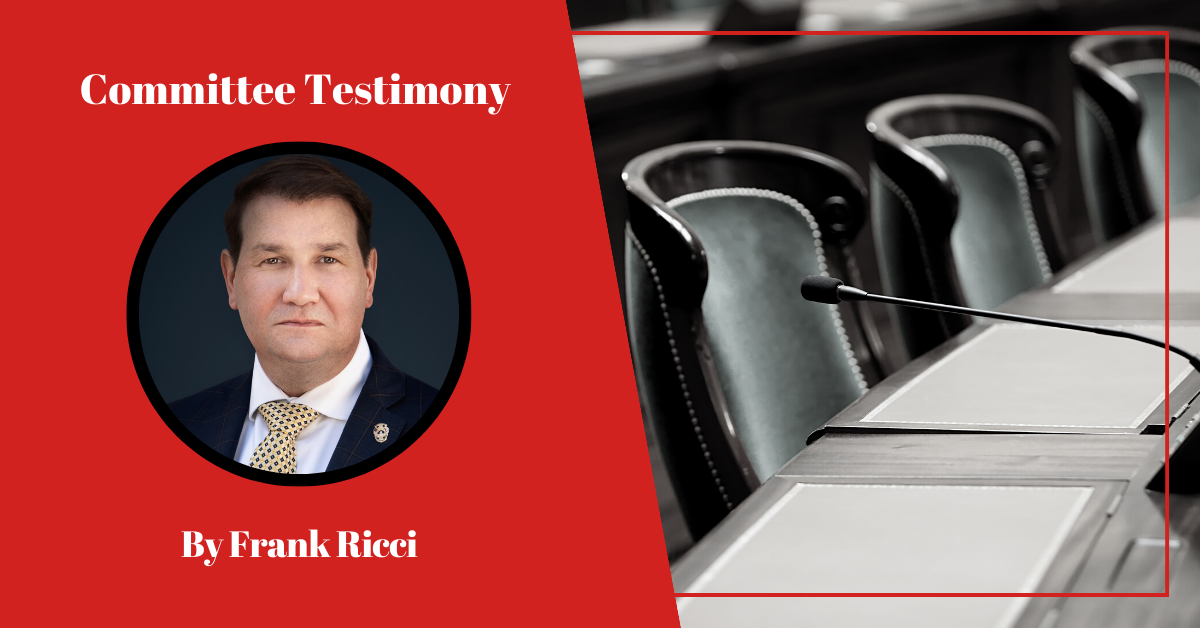Thank you for the opportunity to testify in opposition to H.B. No. 6904. My name is Frank Ricci, and I serve as Yankee Institute’s Labor Fellow. Yankee Institute is a policy organization dedicated to empowering Connecticut’s people to forge a brighter future for themselves and their families.
Yankee Institute staunchly opposes this bill which represents a significant overreach by state government into the marketplace. This legislation does not stand alone but rather combines two previously introduced, problematic bills into one legislative nightmare that will exacerbate Connecticut’s affordability crisis and incentivize labor unrest.
On Warehouse Quotas:
The first part of this bill aims to limit the extent to which warehouse distribution centers can set productivity quotas. While the language seems benign, speaking of “unreasonable quotas,” the reality is far more complex. This proposal will introduce arbitrary standards and regulations that will increase operational costs, ultimately raising prices for Connecticut consumers. It’s not just about protecting workers; it’s about understanding that businesses are already incentivized to maintain safe and reasonable work environments. Federal and state laws under OSHA, combined with market incentives, ensure that safety and productivity are balanced without the need for additional bureaucratic interference.
In Connecticut, warehouses often provide wages above the minimum, along with benefits and signing bonuses, reflecting a competitive market that rewards efficiency and safety. By imposing government quotas, we’re not just stifling business growth but potentially encouraging businesses to leave or automate sooner, reducing job opportunities and diminishing the state’s tax base.
On Unemployment for Striking Workers:
The second, equally troubling component of this bill would allow individuals participating in labor disputes to receive unemployment benefits. This is a direct assault on the balanced dynamics of labor negotiations. By providing financial support to workers during strikes, this bill would tilt the scales, allowing for prolonged labor disputes at the expense of taxpayers and consumers.
This policy is not just misaligned with the purpose of unemployment benefits, which are meant to support those involuntarily unemployed, but it also places an undue burden on businesses through increased unemployment insurance costs. This could lead to higher costs for goods and services, as companies pass along these new expenses to consumers or absorb them, affecting their competitiveness.
I have stood shoulder to shoulder with Sikorsky workers on the picket line and with Stop & Shop employees fighting for fair treatment. In those moments, I understood that both workers and businesses must navigate the complex balance of interests and costs during labor actions, pushing both parties toward the bargaining table in search of a resolution. But this proposed law will tip the scales — placing government’s hand on the scale undermining the very economic balance we depend on.
Past legislative testimony demonstrates that this bill will incentivize labor unrest making Connecticut less affordable. A Stop & Shop worker in 2022 openly admitted that a similar bill was crafted to boost employee “leverage,” stating into the record, “Had we had unemployment benefits to rely on during the 2019 strike, we might’ve been able to stay out longer.” This isn’t just about fairness; it’s about manipulating the system for longer strikes at everyone else’s expense.
Moreover, a company’s unemployment experience rating directly affects its costs, which are then reflected in bids for state, municipal, and private projects. If we start giving unemployment benefits to strikers, company ratings suffer, pushing up the price of goods and our taxes.
Instead of dipping into their own coffers to support striking workers — which should be a fundamental responsibility of unions — the AFL-CIO is urging members to lobby for legislation that makes taxpayers and businesses foot the bill.
There is no cap on union strike funds, so workers could end up earning more on strike than at work. This isn’t just an incentive for labor unrest; it’s a blueprint for it.
Currently, only two states provide unemployment benefits to striking workers: New York, where workers can apply after 14 days on strike, and New Jersey, where eligibility kicks in after two weeks. Even in California, Governor Gavin Newsom vetoed Senate Bill 799 on September 30, 2023. This bill would have allowed striking workers to receive unemployment benefits after two weeks on strike, but the veto was issued due to concerns over the state’s already burdened unemployment insurance fund.
The union’s strategy is clear: “If employers understood that their unemployment insurance experience ratings could be impacted if a strike goes on longer than two weeks, they would be more likely to come to the table and bargain in good faith to avoid the strike in the first place.” But let’s be clear: unemployment benefits are meant for those who’ve lost jobs through no fault of their own, not for those who choose to strike.
This proposal is not just misguided; it’s an abuse of the system, designed to extend labor disputes far beyond what’s necessary or fair. It’s time to call this what it is — an attack on economic stability for the sake of political gain.
This bill, by merging two flawed proposals from past sessions, only doubles down on bad policy. It will make Connecticut less affordable, drive up costs for everyone, and promote an environment where labor disputes are unnecessarily prolonged. We should be supporting job creators, not punishing them with regulations that do not understand the real-world impacts on workers and businesses alike.
Let’s keep Connecticut competitive by rejecting this bill and focusing on policies that genuinely enhance worker rights without undermining the economic vitality of our state.
Respectfully submitted,
Frank Ricci
Labor Fellow

